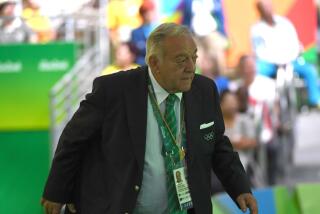The Ben Johnson Steroid Inquiry : IOC Doctor Scoffs at Francis’ Sabotage Charge
- Share via
TORONTO — Dr. Arne Ljungqvist, an observer for the International Olympic Committee’s medical commission during the 1988 Summer Olympic track and field competition, reacted with amusement to testimony from Ben Johnson’s coach that the Canadian sprinter’s positive drug test in Seoul was the result of sabotage.
“The whole thing makes me laugh,” Ljungqvist said Tuesday from his office in Stockholm. “This is more or less routine with positive cases.”
In testimony Monday before the Canadian government’s commission of inquiry into drug use by athletes, Johnson’s coach, Charlie Francis, speculated that an unidentified stranger in the waiting room outside the drug-testing station had tampered with the beer that was provided for Johnson to aid him in providing a urine sample after he had won the gold medal in the 100 meters.
Ljungqvist, who was on duty in the doping control area after the 100-meter final, said the IOC found no evidence to support the charge in an investigation conducted in Seoul as a response to the Canadian Olympic Assn.’s appeal of Johnson’s positive drug test for the steroid stanozolol.
Ljungqvist also denied Francis’ allegations that there were various other violations of the drug-testing procedure at Seoul.
“The doping area functioned perfectly well,” he said. “Once the procedure is over, athletes and accompanying persons are asked whether they had objections. If they are not happy, they can give their reasons on a form. If they are happy, they sign the form. They (Johnson and two authorized companions) signed the form. It’s a bit late to come up with other ideas.”
In cross-examination Tuesday, Francis was asked by Tom Barber, an attorney for Canada’s Sports Medicine Council, whether Johnson had signed the form.
Francis drew a laugh from spectators in the hearing room when he said: “Yes. Somewhere between one and 10 beers, he signed that document.”
Besides Barber, Francis, who testified last week that he has administered steroids to athletes since 1979, was cross-examined by attorneys for the Canadian Track and Field Assn. (CTFA) and the Canadian College of Physicians and Surgeons.
Attorneys for Johnson and his physician, Jamie Astaphan, are expected to give an indication of their clients’ defenses against Francis’ allegations today in cross-examination of the coach.
After 4 1/2 days and more than 17 hours, the commission’s co-counsel, Robert P. Armstrong, completed his questioning of Francis Tuesday morning. In the final hour, he focused on the CTFA’s role in steroid use by athletes.
Francis said that CTFA officials have had at least implicit knowledge of drug use by Canadian athletes since 1981. He made his most damaging allegation against the CTFA’s chairman of the board, Jean-Guy Ouellette.
According to Francis’ testimony, Ouellette offered in 1988 to give advance warning of drug tests to Francis’ athletes if the CTFA instituted a program of random, unannounced drug tests before the Summer Olympics.
“I deny everything,” said Ouellette, who was present during the testimony. “Nothing he said was true on this subject.”
Francis said that he attempted to discourage CTFA officials from adopting random, unannounced testing until they were convinced that other countries that had implemented similar programs were conducting them honestly. He said that he had been told of abuses in Great Britain, the Soviet Union, East Germany, West Germany and Holland.
He said that the coach of a world-class athlete in Holland told him in 1986 that Dutch officials, under the guise of a random, unannounced testing program, sent empty bottles to athletes, instructed them to fill the bottles with urine and return them for testing.
The coach, Francis said, also admitted that he usually gave the bottles to hotel maids and asked them to provide samples.
“As long as the maids aren’t on steroids, we don’t have anything to worry about,” Francis said the coach told him.
Francis compared steroid use to the arms race, saying that one country’s athletes cannot eliminate drugs from their training programs and expect to compete as long as athletes from other countries continue to rely on them.
More to Read
Go beyond the scoreboard
Get the latest on L.A.'s teams in the daily Sports Report newsletter.
You may occasionally receive promotional content from the Los Angeles Times.






